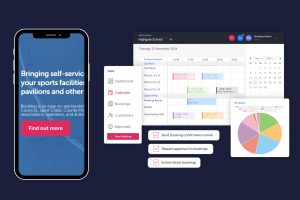Reduce Admin Workload: The Benefits of Automation for your Facility Bookings
Managing sports bookings can be a juggling act, trying to keep everything running smoothly while catering to the needs of hirers. Imagine a world where the hassle of manual bookings and payments is a thing of the past. By introducing a booking system that enables booking and payment automation, venues of all kinds can not only reduce their administrative workload but also create a seamless experience for the community. Whether it’s a local council pitch, a sports club’s 4G pitch or a school sports hall, online booking solutions like Bookteq allow customers to check availability, book, and pay instantly, freeing up staff to focus on what really matters – supporting community sports and encouraging participation. So why stick with traditional methods when technology offers a better way forward?
Automating the Enquiry Process
Traditionally, sports venues have relied on manual enquiries via phone and email, leading to a time-consuming process for both staff and customers. Automating this process can significantly improve efficiency and user experience.
By implementing a booking system that enables automation, venues can provide real-time availability and pricing information. This allows customers to book and pay online, eliminating the need for multiple touch points with staff.
Automated systems can capture all required information during the booking process, reducing the likelihood of errors or missing details. This streamlined approach not only saves time but also enhances the customer experience and satisfaction.
Venues can maintain control over bookings by incorporating an approval workflow. This allows staff to review and approve or reject bookings before confirmation, ensuring that all bookings align with venue policies and availability.
Pay Before Play
Implementing a ‘pay before play’ culture can significantly reduce the risk of debt accumulation for sports venues. This approach, combined with automated payment methods, offers benefits for both venues and customers.
Online payment systems like Bookteq allow venues to capture payments for ad hoc bookings instantly. This eliminates the need for invoicing and chasing payments, reducing administrative workload and improving cash flow.
For regular bookings, customers can be provided the tools to set up recurring payment methods such as Direct Debit or card subscriptions. This enables automatic collection of payments for future bookings on an agreed schedule, spreading the cost for customers while guaranteeing advance payment for the venue.
By adopting these automated payment methods, venues can minimise the risk of debt build-up and reduce the time and resources spent on payment collection. This approach also provides customers with flexible payment options, enhancing their booking experience.
Adopting Customer Self-Service
Customer self-service tools can greatly reduce the administrative burden associated with booking amendments and cancellations. By providing customers with access to their own online account, venues can empower them to manage their bookings independently.
This type of self-service portal allows customers to make changes to their bookings, such as altering dates or times, applying extra charges or providing refunds where necessary, all in line with the venue’s policies. This eliminates the need for staff intervention in routine booking adjustments.
For cancellations, the system can automatically process refunds based on pre-set cancellation policies. This ensures consistent application of rules and reduces the manual effort required to handle such requests.
By adopting customer self-service tools, venues can significantly improve the user experience while reducing their administrative workload. This approach allows staff to focus on other and more value-added tasks.
Summary
Streamlining booking and payment processes is crucial for efficient community sports facility and school lettings management. This articles explores how automation of enquiry and payment methods and a change of culture to pay before play can revolutionise the way facilities handle enquiries, payments, and changes.









